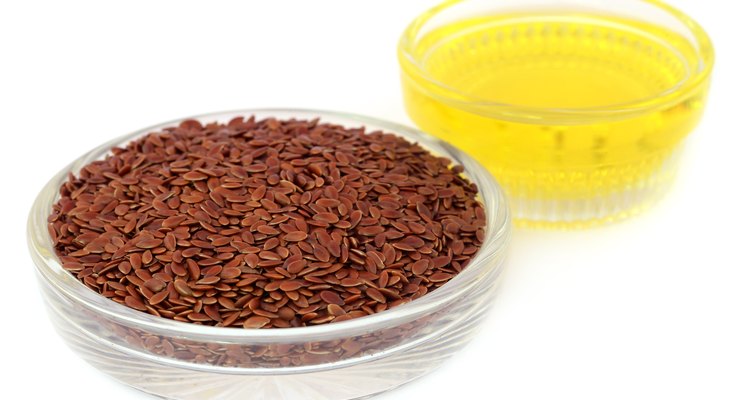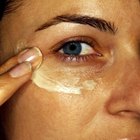
bdspn/iStock/Getty Images
Flaxseed oil does not cause acne. In fact, diet plays very little — if any — role in its development. Instead, acne is often the result of excess oil, dead skin and bacteria. Excess oil and dead skin can clog your pores, whereas bacteria can lead to infection within your hair follicle. This can cause the surrounding skin to inflame, resulting in an acne lesion. Flaxseed oil doesn’t have an effect on any one of these factors, so its inclusion in your diet isn’t contributing to your breakout.
Flaxseed Oil
The only possible way flaxseed oil could cause acne is through direct skin contact, but this is highly unlikely. Certain products, such as cosmetics and moisturizers, can leave a residue on the skin, which can cause dead cells to stick together and form a plug within the hair follicle. This clogs the pore and causes the wall of the affected follicle to bulge, leading to an acne lesion. If flaxseed was left on the surface of your skin, it could potentially cause the same results. This, however, is only conjecture. No studies exist linking flaxseed oil to breakouts.
Self Care
Opting not to take flaxseed oil won’t prevent or control acne breakouts. Rather, wash your skin with a gentle cleanser twice a day and avoid moisturizers, lotions, sunscreens and other cosmetics that can leave an oily residue on the skin. Look for skin products labeled noncomedogenic, which means they won’t clog your pores. The same is true for those that are water-based. Always wash your face before bed and shower after exercise.
Medications
If self-care measures fail to prevent or control acne, medication can often help. Over-the-counter topical treatments can often speed recovery for mild to moderate breakouts. Look for acne creams containing benzoyl peroxide, resorcinol, salicylic acid or sulfur as their active ingredient. For moderate to severe acne flare-ups, a prescription medication may be necessary to improve your complexion. Talk to a doctor or dermatologist to determine the best course of treatment.
Precautions
Although flaxseed oil isn’t known to cause acne, it can have certain side effects. The Memorial Sloan-Kettering Cancer Center notes that flaxseed has been linked to constipation, increased bowel movements and flatulence. It may also change the rate of absorption for some medications, including anticoagulants, cholesterol-lowering medications and blood sugar-lowering drugs. Talk to your doctor before taking flaxseed oil to treat a medical condition.
Related Articles

The Best Facial Moisturizer That Won't ...

How to Repair Open Pores

How to Take Care of Painful Ingrown Hair

Petrolatum and Acne

How to Get Rid of All the Tiny Embedded ...

How to Get Lighter Skin Without ...

How to Remove a Dilated Pore on the ...

How to Fix an Irritated Upper Lip After ...

How to Get Rid of a Dark Line Above My ...

How to Do Your Eyebrows at Home Without ...

How to Stop Hair Growth on Your Fingers

Can Hair Dye Cause Severe Itching of ...

How to Maintain Good Skin After Accutane

Can You Use Castor Oil for Psoriasis on ...

How to Heal an Inflamed Bikini Area

How to Prevent Pock Holes From ...

Can Borage Oil Help Acne?

Uses for Castor Oil on the Skin

Are There Ways to Get Rid of Blocked ...

Subungual Warts and Treatment
References
Writer Bio
Based in Minneapolis, Minn., Dana Severson has been writing marketing materials for small-to-mid-sized businesses since 2005. Prior to this, Severson worked as a manager of business development for a marketing company, developing targeted marketing campaigns for Big G, Betty Crocker and Pillsbury, among others.
Photo Credits
bdspn/iStock/Getty Images